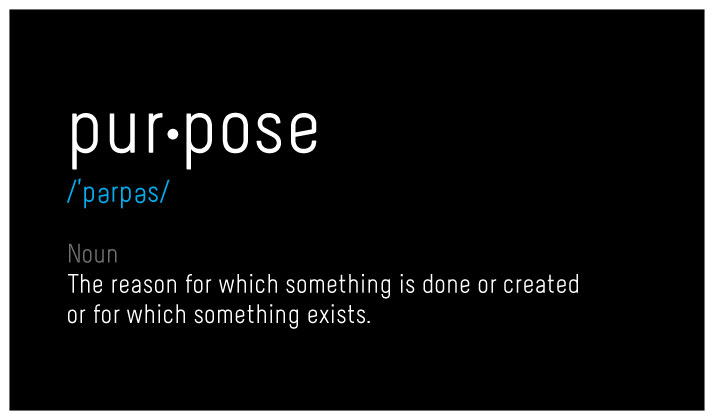Each Tuesday afternoon we have a meeting in the International Affairs division at Dallas Baptist University. The purpose of this meeting is to Encourage, Inspire, Pour Into, and Enable our teams in their leadership and their individual purposes within our division. We call this meeting the Purpose & Leadership meeting. This past Tuesday, I shared with the group my personal convictions and beliefs about Purpose.

Reflecting on this past meeting, I also wanted to share with you “Why I do What I do”. I have always felt that in order to do something meaningful, you need to know the motivations or purpose beforehand. As an example for your leadership, I truly desire to share part of the “purpose” journey God has brought me on. I pray it is helpful for you who may be on this same journey now. There are three major areas (The Gospel, My Doctorate, Leading at the Christian University) that I would like to highlight for you in regards to the purpose and motivations behind “Why I do What I do”.
The Gospel
First and foremost, I have highly personally experienced the grace and love of God though our savior Jesus Christ. As a Christian, we refer to this as “The Gospel.” My life has been transformed as a response to the gospel of Jesus Christ, and I have in turn given my life to relentlessly follow Jesus. I see that following Jesus is much more than simply knowing in my mind that He died on the cross for my sins, regular church attendance, or a set of rules to follow. Following Jesus is living his teachings, following the promptings of the Holy Spirit, and waiting expectantly for his return. By living Jesus’s teaching, I have been led to an understanding of my purpose in life, as well as given a burden heart to serve others.
I believe that in the gospel of Jesus Christ, I have a purpose in an epic and cosmic plan. I believe this purpose is God revealing and reconciling all things to him, which is the greatest cause known to man. For these purposes, I have greater meaning and more fulfillment than anything I can ever hope to know or achieve on my own. I believe that each of us are called or purposed by God in this same plan, but that we need to follow Jesus before that can be made known to us. In a practical way, I see the purposes of Jesus penetrating all aspects of my life including my job, which I would refer to as a “calling.”
My Doctorate
Second, and through my doctoral program, I have encountered a strong understanding for how “purpose” contributes to organizational leadership. As an example Burns (1978) describes this very well in the transformational leadership theory of inspirational motivation. I consider purpose to be a clear understanding for how one makes meaning out of their life, and how this meaning becomes valuable for a cause, for others, and for oneself. Once known, purpose acts as a guiding light and rocket fuel for one’s life or calling.
I believe that great leadership begins with a strong purpose in life (Craig & Snook, 2014; Joshi, Marzalek, Berkel & Hinshaw, 2013; Christensen, 2010; Pink, 2009; Frankl, 1958) and a strong alignment of that purpose to a timeless cause or vision (Kanter, 2011; Mourkogiannis, 2007; French, 2006). Furthermore, I find that exceptional leaders can enable others to pursue a timeless vision or cause by leading from a strong sense of purpose (Csikszentmihalyi, 2003; Brandt, 2003; Boyatzis, McKee & Goleman, 2002; Bartlett & Ghoshal, 1997; Burns, 1978), and it is the result of a strong purpose, and its alignment to timeless vision (or cause), that enables incredible impact on the organization and for those it serves (Kanter, 2011; Mourkogiannis, 2007; Collins & Porras, 1994).
Leading at the Christian University
Third, to help me remember what my purpose is, I have developed a purpose statement. I believe that my purpose in life is to “Model the example of Jesus Christ in a manner that is pleasing to the Lord for my family and circles of influence. I will consistently serve others by helping them to find their purpose, excel in their callings, and grow in their relationship with God.”
This purpose statement embodies the Christian values that I hold most important, and is the way I make meaning of my life, bring value to others, and serve a greater cause. I believe that my purpose in life is best served at the Christian University. As I continue to study the concepts of Organizational Leadership, behavior and theory, I am learning to a greater extent how to successfully hire the right people, put them in the right place, and develop them to believe in and accomplish the purpose of Jesus at the Christian University.
I most identify with what Zigarelli (2012) called the interrelated missions or aims of the Christian University; which are to Train, Transform, and Transition students. By serving as a senior administrator, I am passionately motivated to lead the Christian University into the accomplish this mission. I believe that apart from Christ, higher education does not hold the transformational affect and powerful impact to the world and to the students it serves. In addition, I believe that the future landscape of higher education will change in the years to come. I desire to equip and lead the Christian University through perhaps what could be challenging days ahead. I am particularly interested in advancing the Christian University’s capabilities for administration, international development, and international student recruitment.
It is the gospel resulting from my experience with Jesus, which now gives me a burden heart to serve others. My purpose in life is grounded in the cause of Christ, which fuels my personal leadership philosophy and drives my life and calling. In these ways, I would not consider myself to be just a transformational leader at the Christian University, but a Christian educator who is called to be an “admissionary.” For me at the Christian University, the transformation we are working on does not encompass only efficiencies and effectiveness gained, degrees conferred or jobs attained, but in lives transformed, purposes found, callings excelled, and Jesus Christ made know to others through the work we do!
This is “Why I do What I do”.
– Grey Hoff, Jr.
——–
References:
Bartlett, C. A., and S. Ghoshal., (1997). Beyond Strategy, Structure, Systems to Purpose, Process, People: Reflections on a Voyage of Discovery. Monash Mt. Eliza Business Review 1, no. 1 (September 1997): 54–61.
Brandt, J. R. (May 01, 2003). Managing For A Higher Purpose. Industry Week/iw, 252,5.)
Boyatzis, R., McKee, A., & Goleman, D. (2002). Reawakening your passion for work. Harvard Business Review, 80(4), 86-94.
Burns JM. (1978). Leadership. New York, NY: Harper & Row.
Christensen, C. M. (2010). How will you measure your life? Harvard Business Review, 88(7), 46-51.
Craig N, S. S. (2014). From purpose to impact: Figure out your passion and put it to work. Harvard Business Review, 92(5), 104-11.
Collins, J.C., & Porras, J.L. (1994). Built to Last: Successful Habits of Visionary Companies. New York, NY: HarperCollins.
Csikszentmihalyi, M. (2003). Good Business: Leadership, flow, and the making of meaning. New York, NY: Penguin Group.
Frankl, V. E. (1958). On logotherapy and existential analysis. Am J Psychoanal the American Journal of Psychoanalysis, 18(1), 28-37.
French, M. L. (2006). The alignment between personal meaning and organizational mission among music executives: A study of happiness, job satisfaction, and responsibility toward employees.
Hirsh, S. K., and Kummerow, J. M. (1998). Introduction to Type Organization: Individual Interpretive Guide (3rd ed.). Mountain View, CA: CPP, Inc.
Kanter, R. M. (2011). How great companies think differently. Harvard Business Review, 89, 11.)
Mourkogiannis, N.,. (2007). Purpose: The starting point of great leadership. LTL Leader to Leader, 2007(44), 26-32
Pink, D. H. (2009). Drive: The surprising truth about what motivates us. New York, NY: Riverhead Books.
Zigarelli, M. (2012). Training, Transforming, and Transitioning: A Blueprint for the Christian University. Journal of Research on Christian Education, 21: 32-79, 2012.
![]()
Purpose is the guiding principle for why something is done. When you understand your purpose in life, and how it is connected with your vocation, a particular project, or task, these things take on an entirely new shape. Understanding the WHY gives you powerful perspective for the HOW and the WHAT.
While I believe that purpose can be the single greatest motivator for you in the workplace, and that aligning your purpose to the organization’s mission will ignite the rocket fuel you have — Purpose is not a Magic Word.

Purpose takes Focus
When you try to shoot a bow and arrow, it requires you to close one eye, squint, and focus very hard at the center of a target. Expert marksman train tirelessly in order to aim and hit the middle of the target. Just the same purpose requires you to focus tirelessly on who you are, what your life experiences have shown you, and a firm understanding of how you can use these things to serve others in the future. These things will be very abstract and ambiguous to start, but focusing on them over and over again, they will become clearer. Purpose takes focus.
Purpose takes Repetition
Purpose is like a muscle. The more you train it, the stronger in gets. Disciplined repetition and focus will serve you very well when trying to learn about your purpose. When you find something great about yourself, a skill, a passion, a behavior trait that you have been given, focus on it and repeat it. Just like the muscle, keep practicing with it, over and over again. The strongest performers are those who will invest in a daily practice of reinforcement and refinement.
I believe the things God has placed into your hands are “whispers from him” for your purpose in life. Focus on them, and repeat your use of them.
Purpose takes Time
Purpose starts off as an abstract, ambiguous, big ball of mess at the beginning. Frankly speaking, when I first talk to other people about purpose, I usually get some sort of blank stare or confused smirk on their face. Many people give up on dedicating the time to consistently look at their skills & abilities, personality & behavior, as well as passions & desires as the “bread crumbs” God leaves behind, pointing to your purpose.
Don’t give up! Purpose takes focus; it takes repetition, and also time to unlock.
Purpose is something you Live
There is no doubt in my mind that you have been called and have been purposed by God for greatness. I know this because you are still alive, breathing, and reading this blog post. God doesn’t need to use us, but he chooses to do it.
I am reminded of an excellent quote from Pastor Brian Houston of Hillsong Church; “Everyone who is born dies, but not everyone who dies has truly lived. God does not want you and me to die full of potential. He wants you to live for something worth dying for. When Christ’s cause truly underpins your life, you will discover meaning and purpose, and your life will never be the same again.”
Purpose is not some magic word to throw around. It is an individual’s unique and timeless idea of how they will bring meaning to the lives of others, to themselves, and ultimately to the Kingdom of God. Once you understand your purpose, it’s something that penetrates and motivates all aspects of your life. It’s something you live!
![]()
If you are reading this post, then I assume you are interested in being productive and growing in a positive direction for 2015. That is great!
Last year, I received a good amount of feedback on the blog about goal setting titled; Target Practice: Being a High Achiever in 2014. Therefore, I wanted to “dust off” that post and share some additional perspective that I learned from this past year. This post summarizes how I personally am effective in establishing yearly goals. Please choose what is most valuable for you.
Each year, I continue to spend a week or so before and after the New Year for goal setting. I think about all sorts of ideas, tasks, plans, and desires I would like to be apart of in the future. I set this time aside so that I can focus my energy and time productively during the future year. Most importantly, I spend consistent time in prayer bringing these thoughts to God; asking Him for direction in the upcoming year.
Here are a couple of very important reasons why goal setting is valuable:
First, high achievers are goal oriented. People who achieve, create goals, and plan. We are a great deal more effective in our personal, professional, and even spiritual lives when we set goals for ourselves. This is a plain and simple truth, if you want to make the most of your year and really achieve great results, SET GOALS!
Second, We tend to get what we focus on. I want to focus my energy on good, timeless, and God-honoring goals that are beneficial for myself, my circles of influence, and those I care about. I have found that if you do not set your sights to focus on good things, you will get distracted by things that aren’t. You get what you focus on — focus on the Lord and the plans He has for you. If you do not set your sights on a good target, you will decrease the likelihood of hitting anything worthwhile.

When setting your goals for this next year, here are a couple of important things to keep in mind:
1) Make SMART goals.
SMART goals are Specific, Measurable, Assignable, Realistic, and Time Related (SMART). Make your goals with SMART in mind.
After I start thinking through my ideas for the next year, I make sure that all of my goals eventually fit these characteristics. Here are few examples of my 2015 goals using the SMART guidelines:
- Become a basic conversationalist in Spanish by completing the level 1 and 2 courses by Rosetta Stone (carried over from 2014).
- Maintain a regular exercise pattern by working out a minimum of three times a week (carried over from 2014).
- Continue to maintain my Website and Blog, actively post new knowledge and engaging content bi-weekly (carried over from 2014).
- Develop as a teacher of the bible; evaluate and commit to preaching at 5 different church services, opportunities, or events this year (New Goal).
2) Write down your goals.
By writing down your goals you engage yourself to really think about what is important to you during the next year. If you do not take the time to write out your goals, you will be less likely to achieve them.
Michael Hyatt shared on his blog last year about a conclusive research study by Dr. Gail Matthews, a psychology professor at Dominican University in California. Her study on goal-setting with 267 participants found that you are 42 percent more likely to achieve your goals just by writing them down.
3) Get accountability and regularly discuss your goals with others you trust.
After I develop my goals for the year, I share them with a group of close men whom I trust. One of them is my good friend Sam, who shared with me last year the following reminder about goals setting and accountability:
“The ultimate outcome we want is to go through life together and get each other’s back so that we can successfully keep moving in the direction God is calling us to. So, spend some time just thinking and praying about this next year … Remember, Community is God’s answer to defeat. Ecclesiastes 4:10 says, “If either of them falls down, one can help the other up. But pity anyone who falls and has no one to help them up.”
Remember, you can try, but you can’t live life well on your own. We all need other people to walk with us, work with us, and watch out for us. In fact you Be sure you share you goals with someone you trust and ask for accountability in how you are working to achieve your goals throughout the year.
4) Do not get discouraged when you feel that you’re not meeting some of your goals.
This past year I personally missed achieving about half of my 2014 goals. That does not discourage me, most high achievers frequently miss their goals. Think how many goals I would have achieved if I did not set any yearly goals? Probably little or none. Goal setting for the year is key; but realize you may not achieve all that you set your sites. Do not get discouraged.
5) Do not be afraid to re-prioritize your goals throughout the year.
An exciting part of goals setting is that they can be changed. Frequently I will go through the year, stumble upon some additional information or be led by God in another direction. During these times some of my yearly goals will change. Given that we desire to constantly learn more, our aim or goals will frequently change. Do not be afraid to tweak your goals, this is not admitting defeat, but rather applying additional knowledge that you received to improve your aim.
6) Make sure your yearly goals build your purpose in life.
Purpose in life is largely derived from the belief that you have valued activities in which to engage.
You do not wake up one morning and simply accomplish your purpose in life. It is a constant, consistent, and committed set of activities that you will complete each day, week, and year. They compound into a long-term impact for those around you, and ultimately for the glory of God. Setting your yearly goals is deciding upon which activities are most important and most beneficial for you to accomplish, which build your purpose in life.
If you are still breathing (which I assume you are if you are reading this), then you have a purpose in life. There are important things that God is wanting to use you for, to make positive impact in our circles of influence, serve others, build His Kingdom and glorify Him. How you are going to achieve your purpose in life without knowing what that is, asking him for direction, and then working on those things through the year?
Remember, if you do not pick up your arrow and set your sights on the target, you will miss 100% of the time. If you wish to be a high achiever for 2015, be sure you take time to set your yearly goals!
God Bless in 2015!
![]()
Over the past few months I have been reading the book 30 Life Principles by Charles Stanley with my Thursday morning men’s bible study. This is an excellent book and I would highly suggest checking it out. This past week, I read a section of this book which had good application for leadership and professional development that I wanted to share: Life Principle #25 – God Blesses us so that we may Bless Others.
I work at Dallas Baptist University, where we talk a lot about Servant Leadership. Reading through this book, and reflecting on the concepts of Servant Leadership, I wanted to share a couple of important ideas of why it is vital for leaders to be obsessed about serving others:
1) God gives each of us all unique abilities and resources.
You may feel that you don’t have much to offer people, or you may be confused about what your talents, abilities or purpose is. Realize that if you know Jesus Christ as your personal Lord and Savior, God gives you a tremendous gift that you can use to bless others. That is a promise!

1 Peter 4:10 says, “As each one has received a gift, minister it to one another, as good stewards of the manifold grace of God. Romans 12:5-8 says, “In Christ, we have different gifts, according to the grace given to each of us. If your gift is prophesying, then prophesy in accordance with your faith; if it is serving, then serve; if it is teaching, then teach; if it is to encourage, then give encouragement; if it is giving, then give generously; if it is to lead, do it diligently; if it is to show mercy, do it cheerfully.
2) These Abilities and Resources have been given to us in order to bless others and build His kingdom.
We need to realize that the reason God has given us such immense blessings (abilities and resources) was so that we would use them for His glory and for the furtherance of the gospel. God’s gifts to you were never meant to be hoarded. They were given to be used wisely as you serve others through the power and wisdom of the Holy Spirit.
We are most effective as leaders when we intentionally use our talents and abilities in our work, our ministry, and all other aspects of our lives to serve others.
Ephesians 4:11-12 says, “Christ himself gave the apostles, the prophets, the evangelists, the pastors and teachers, to equip his people for works of service”. Romans 8:28 tells us, “We know that in all things God works for the good of those who love him, who have been called according to his purpose.”
3) We have a choice whether we are going to encounter God to discover these abilities, then use them to bless others and honor Him.
Our love for God and others motivates us to serve, it inspires us to give freely so that others can be blessed and one day come to know salvation and enter into a relationship with Him. However, we have a choice as to whether we are going to our abilities for our own purposes, or bless others.
Only you can stop God’s goodness, the abilities he has given you, from flowing through your life and into the lives of others— and you do it by hoarding His gifts.
Acts 20:35 says; ” In everything I did, I showed you that by this kind of hard work we must help the weak, remembering the words the Lord Jesus himself said: ‘It is more blessed to give than to receive.” Luke 12:32-34 tells us, “It is our Father’s good pleasure to give you the kingdom … a treasure in the heavens that does not fail, where no thief approaches nor moth destroys. For where your treasure is, there your heart will be also. (Luke 12:32–34)
4) Are you using your gifts in a way that honors God and blesses others?
I used to selfishly use what God has given me to pursue after money, power, recognition, and personal gain. I can promise you these pursuits will not end well. You will be left empty, without meaning, and alone. You will end up with a perpetual state of chasing after stuff the rest of your life. I do not want that for you! Purpose and meaning is found alone in Christ.
Therefore, look for opportunities to use your talents and resources to love and serve others. Then watch how God works. Soon you’ll see that it truly is much more blessed to give than to receive.
As leaders, we need to model the way, using our talents to invest into others through mentoring, and showing that through our words, actions, and decisions we truly desire to serve others. We need to take intentional opportunities to help others find what their abilities are and how they can practically demonstrate their love for others through their calling to bless others.
We are told the only thing that will last the test of time is the gospel and the church. I don’t know about you, but I want to build something that lasts forever!
Cited Source: Stanley, C. F. (2008). 30 life principles: Study guide. Nashville, Tenn: Thomas Nelson.
![]()
We each have a deep felt need for meaning in this life. I have had the opportunity to travel to many different countries around the world, and consistently I see that we all yearn for a sense of meaning or purpose. We all want to belief that there is a reason for life. This question comes in many shapes and forms, but it sounds something like “What am I hear for?” or “What is the meaning of life?”
At some point of another, we all have these thoughts or questions. The problem is, many of us seem to dismiss the idea of “purpose” or “meaning in life” as some kind of fairytale, abstract thought, or crazy concept — one that we will never come to understand, let alone personally discover.
Over the past few years I have been personally wrestling with the concepts of purpose. As a young professional in Dallas, TX, I have watched my counterparts (and myself for that matter) chase after money, power, pleasure, etc. to eventually get caught up in the perpetual state of breathing, consuming and sleeping, as a continual cycle of life.
I observed this mind-numbing trend, but it was not until my first semester of my doctoral program that I begin to put a name to what I was noticing.
I keenly noticed that were some people that were driven by a pursuit of something greater. There were those who were driven by a belief that they were fulfilling a purpose (some valuable aim which benefited others that was beyond the intrinsic). There is subset of people who believe that they are contributing to something greater than themselves, and that in this pursuit they have meaning and happiness. They have a deep understanding of their purpose in life. And they understand how they are fulfilling that purpose through very practical and specific ways in their career and personal life.
I began to zero in on this idea, and came to call it “purpose in life” or “meaning” for the individual. Purpose is the reason something is done, created, or for which something exists.
I believe that the understanding for one’s “purpose in life” is a journey of self-exploration, self-awareness and actualization. This is a journey that is different for each individual, but I think we can use certain tools to enable this discovery: Finding Purpose.
The Source of Purpose
As a Christian, I am led by my belief that there is a one-true God and that through his son Jesus Christ, we can ultimately find meaning for this life. It is through accepting his son Jesus Christ as Lord and Savior, can we come to know this. I believe this to be true because of my personal experiences with Jesus Christ that I have encountered in my life, and in the lives of those around me.
The bible tells us in Psalm 139:13-16 that God “created my inmost being; He knit us together in our mother’s womb … we are fearfully and wonderfully made; His works are wonderful … All the days ordained for us were written in His book before one of them came to be.” Also, Ephesians 2:10 tells us that “We are God’s handiwork, created in Christ Jesus to do good works, which God prepared in advance for us to do.”
The fact that we are breathing and living on this planet tells us that we have a purpose. The Lord has prepared us in advance to do good works, He is not done with us yet if we are still alive.
We have been made with purpose and each of us have a reason for living. It is our ultimate purpose to bring Him glory with the various aspects of our life. Following Christ is the greatest adventure that each of us will ever have, it is an adventure and life of purpose. The question is, in what way or through what vocation will you live your purpose?
—————–
To read more about how purpose contributes to organizational leadership, read the blogs titled: Exceptional Leaders lead with Purpose and Finding Purpose on the Job – Motivating the Millennial Workforce.
![]()
You will find many definitions for what exceptional leadership looks like. In fact, exceptional leadership can often times be relative to the environment of the leader. However, I have noticed that there seems to be three trends which are present with exceptional leadership. First, exceptional leadership begins with a Purpose, being the foundation. Second, exceptional leaders have a timeless Vision, or communicating dreams into reality, and third exceptional leaders inspire great Action, which are the results of a purpose being fulfilled through a timeless vision.
I would like to take a few moments to talk about what Purpose in leadership looks like:
Purpose
Having a well defined Purpose is a critical foundation for exceptional leadership. Purpose is defined as “the reason for which something is done or created or for which something exists”. In other words, this is your “WHY”. When you relate purpose to yourself or to your leadership, the question is “WHY” are you here? “WHY” do you even bother? “WHY” do you lead? The answer to this questions is far beyond just making money, or having a secure job. We are not talking about management, this is exceptional leadership. Exceptional leaders are compelled by something greater that just monetary gain. Exceptional leaders are compelled by a clear, well define Purpose.
To expand further, exceptional leaders possess three key elements when it comes to purpose: (1) a greater than average sense of purpose in life and meaning; resulting from a heightened level of self-awareness, (2) a strong understanding of what their organization’s purpose is and, (3) a belief that they are fulfilling their purpose in life which fits with the identity of the organization they are leading.
Without having a clear understanding of your purpose in life, you will not be able to grow to the most exceptionally leader that you could be. Let me give you a few examples; Martin Luther King, Abraham Lincoln, Steven Jobs, Ghandi, Mother Teresa and countless other authentic leaders were each driven by a deep understanding of what they or their organization was trying to do. They were led by their deep sense of purpose, which was communicated through their vision, and put into action by their decisions.
The first step for taking your leadership to the next level, and even understanding “WHY” you yourself exists, is defining your purpose in life.

This past year, I began a new journey in my life when I started my doctoral program in organizational leadership. As I interacted with other leaders from across the country, I ran into a powerful idea … Purpose. Throughout my coursework, I grappled with and researched further as to what purpose meant for leadership. My results were compelling, almost all of the leaders I perceived to be exceptional, had a well defined purpose in life. Furthermore, their purpose was timeless and was not motivated by extrinsic rewards (such as money, recognition, or power).
What I also found to be interesting was; Leaders who lead with a strong purpose, and also aligned to the organization’s mission that they lead, tend to perform to greater extents than others that do not.
Praying through these ideas, seeking guidance from God and others I trust, I established my own purpose statement which is a reminder for me on my purpose in life. Here is what I believe to be my purpose in life:
Model the example of Jesus Christ in a manner that is pleasing to the Lord for my family and circles of influence, consistently serve others by influencing them to find their purpose, excel in their callings, and point them toward God.
I will accomplish this by:
- Modeling Jesus Christ’s example, and letting everything that I say, do, touch and have influence over be honoring to God.
- Helping others to find their purpose life by mentoring and developing them to become more effective in their vocations.
- Leading within Higher Education, helping institutions become the most effective environment to teach others How to Think and to Choose for themselves and developing others to have the ability to tell the difference between a groundless argument and one based on fact or logic.
- Building Trust relationships.
- Growing in Transformational leadership.
- Transforming others into a life with Jesus Christ.
- Passion is something that I will pass on …. I will do it with God’s love!
My purpose for writing this is so that you can spend time in front of God asking him to reveal your purpose in life to you. I pray that God can use you to authentically lead with Purpose and Vision to produce extraordinary Action for His Kingdom!
![]()
We each have a unique story to tell. Our authentic story, lived out in a real way, gives us tremendous influence to make a lasting impact on others.
Think about this for a moment.
As individuals, God has equipped each of us with a unique mix of skills & abilities, a distinctive personality & behavior, and certain passions & desires. These things have been given to us as a “tool belt” by God to use in this life. Our “tool belt” equips us with the tools necessary to accomplish our purpose in life. In addition, the “experiences” we encounter also give us a very unique perspective in order to share our stories with others. The good, bad and even ugly experiences in our life come together to help shape our authentic story.
Romans 8:28 and Ephesians 2:10 from the bible remind us that God works for good in all things for those who love him, and also that we have been created in Christ Jesus long ago for His purposes to do good works.
By sharing our authentic story or “experiences”, as well as the wisdom learned from them, we find a valuable way to influence, inspire, develop and serve others.
Our “tool belt” and “experiences” come together to shape who and what we are under Christ. In fact, we really are a mix of these elements; it is the combination of these items that shape our authentic story. The trick is to understand these things in an intimate and vulnerable manner. This is what it means to be Self-Aware. Self-Awareness, or the understanding of one’s self to an intimate and vulnerable extent, is the beginning to authentic, influential leadership.
As a young professional growing up, many times I tried to mimic others whom I perceived to be successful in life or business. I found that while this process revealed a wonderful amount of insight and knowledge, I always seemed out of place. Often times I found this was a mistake, I would end up mimicking something that I was not. I felt like I was constantly trying on clothes that did not fit quite right.
What resulted was a realization that I needed to spend time focusing my efforts on understanding “Who I Was”; this included an intimate understanding of my “tool belt” and what my life “experiences” meant.
God has created each of us to be unique. When we try to act as how we see others, the result will not be authentic. In fact, when your leadership is perceived as unauthentic, the results will not build trust, nor will it provide meaning and purpose for your life.
There are two important concepts which are vital for leaders to understand: (1) Unauthentic leadership does not last, and (2) Self-awareness is the beginning for discovering authentic leadership.
Authenticity is a key trait for developing as an influential leader. Now, as a higher education administrator, and someone who spends a great deal of time with college students, I intentionally encourage others to discover and understand who they are.
Taking time to discover your “tool belt” and “experiences before God will lead to a greater understanding of “Who you Are”. Furthermore, this will lead you to help discover what your purpose in life is, which is tied to your authentic and unique story that you can share with others.
One of the reasons for building this website and blog was to encourage others to discover their “tool belt” as well as what life “experiences” make up who they are. When we use our “tool belt” and “experiences” in the way they are intended, God will use our life in a tremendous way to influence others and for making a lasting impact.
I would like to invite you to take check out our page: Finding Purpose
This page offers a variety of different assessments which have been put together to aide you in discovering your “tool belt”. Complete these assessments and then record your personal results from each of them. Additionally, I suggest taking time to map out the major experiences encountered in your life. These are all breadcrumbs from God which can assist you to discovering your purpose in life.
We each have an authentic story to tell, what’s yours?
![]()
In our lives we have been told to focus on externals. By externals, I mean anything outside of your body, ie: Money, Possessions, Power, Accomplishment, aka. Stuff.
The problem with externals is that they will never bring you happiness, meaning or purpose. For generations psychologists, philosophers and religious leaders have all been “preaching” the same thing (pun intended). There is no-doubt that by focusing on externals, we will never find meaning.
You are therefore are left with a choice, we can either (1) choose to ignore these warnings and focus on STUFF, or (2) choose to REVERSE YOUR THINKING and focus on something else. The only thing left besides the external is the internal. We can look inward to find purpose, meaning and happiness.

Recently, we listed a quote of the week from Laura Goodrich, “You get more of whatever you focus on”.
This quote is a helpful reminder for us that whatever we dwell on, chase after, or achieve for, is usually what we get. Whatever we focus on affects our attitude, behavior, lifestyle and relationships with others. When we focus on negative consequences, we tend to think in a negative context. When we focus on externals, we become driven by them and are often devastated when they either do not materialize, or are left with a void after their limited gratification wears off.
This quote also has application when looking at your Purpose in Life.
In the years prior to my graduation from College, I preoccupied myself with finding a good job. The great majority of my efforts were focused externally on one thing, a great job upon graduation. I focused so heavily on this one thing, I eventually drove myself sick trying to land the perfect job. In the end I was utterly confused about my career path.
It was not until I focused on my internal self; through an intimate, self-awareness journey to learn what my God-given skills & abilities were, my personality and behavior, and my passions and desires, did I begin to understand how and what I was made for. I began to understand my Purpose in Life.
I reversed my thinking by not focusing on the job, but focusing on who I was and what came naturally to me. I then would find vocations that fit these areas of my life.
Focusing on me resulted in receiving a great job offer upon my graduation as a by-product of my understanding of whom and what I was. Focusing on my Purpose in Life made the job process an authentic and natural extension of who I was. I reversed my thinking by not focusing on the job, but focusing on who I was and what came naturally to me. I then would find vocations that fit these areas of my life.
As another example, the bible tells us that our focus should be on Christ. Matthew 6:33 says to seek first the Kingdom of Heaven and His Righteousness, and all else shall be added. Understanding that “We tend to get what we focus on”. We are to develop a reliance on Christ and relentlessly pursue Him. By doing this, all else in a fulfilled life and a life of purpose will be added. Christ is not only vertically above us, but as a Christian, he also lives inside of us through the Holy Spirit.
We need to change our focus. We need to reverse our thinking.
![]()
What does shoe shopping have to do with finding purpose? Well, I’m glad you asked. Let’s start by picturing yourself in a large shoe store, very similar to the store shown below:
There are rows and rows of shoes with different colors, sizes, shapes and materials. As you peruse through the rows of shoes, you begin to see certain styles and colors that appeal to you. Selecting a few different shoe styles, you begin to try them on, one by one, to see which fits most comfortably. You begin asking yourself, which shoes look the best on you, and which shoes best fit the purpose and reason for their purchase?
Finding purpose, is a lot like shoe shopping.
As we described earlier in this site, Purpose is a deep rooted set of values in which you believe that what you are doing is worthwhile and will have a positive and beneficial impact on others and society. Purpose in Life is the foundation in which all else of a fulfilled life and impactful career is derived. People that have a greater sense of purpose in their lives, resulting from a heightened level of self-awareness, tend to perform to greater extents than their counterparts and are more fulfilled and happy in their lives. Purpose in Life begins from a very intimate, vulnerable understanding on one’s self, including one’s skills & abilities, personality & behavior, passions & desires, as well as a willing and prayerful heart for God’s direction.
From my years of working with college students and in higher education administration, I have found everyone’s process to find purpose is very different. However, I have noticed a particular trend that involves focusing on these areas: (1) skills & abilities, (2) personality & behavior, (3) passions & desires, (4) a willing and prayerful heart for God’s direction.
No one, apart from God, can find your own purpose in life. It is up to the individual to start their journey to see what skills & abilities, personality & behavior, passions & desires they have, and then begin to see what shoe fits. All we can do is take others to the shoe store, provide advice based on our own experiences, and point them in the right direction. The size, style and color is up to the wearer.
If you decide to take this journey, you will encounter some very hard and sometimes scary truths about yourself. However, it is in those moments of vulnerable self-awareness that you can understand what experiences (both good and bad) that have shaped you overtime. I encourage you to map out your skills & abilities, understand your personality & behavior, and cultivate your passions & desires — then bring this all back to God and ask Him what He wants you to do with it.
The bible tells us in 1 John 5:14-15 that if we have confidence to ask in His name and in His will, our Lord will answer us.
I encourage you to begin the journey to understand purpose, you need to start to mediate and “unpack” these areas about yourself.
It’s time to go shoe shopping!
![]()


